Dr. Mardy's Quotes of the Week ("Ignorance in Action")
March 30-April 5, 2025 | THIS WEEK'S THEME: “Ignorance in Action"
Great Opening Line of the Week
A popular technique in non-fiction writing—and especially in philosophical treatises—is to begin with a grand declaration that is subsequently explored in the rest of the work. In this case, the provocative opening line comes from one of the great minds in the history of Western philosophy, and also one of the most quotable.
Schopenhauer’s thesis is hard to disagree with: ignorance is understandable in people who’ve never had access to education and the world of ideas, but it’s a dark stain when it occurs among people of means.
For more than 2,000 memorable opening lines from every genre of world literature, go to www.GreatOpeningLines.com.
This Week’s Puzzler
On April 6, 1992, this man died at age 72 in New York City. While the official cause of death was heart and kidney failure, a decade later, his widow revealed that his heart and liver problems were the result of an HIV infection contracted from a blood transfusion during a 1988 triple bypass surgery. That news was kept secret out of concern that a public health crisis might develop if large numbers of people began to suspect HIV contamination of the nation’s blood supply.
Born in Russia in 1920, he was only three when he moved with his family to the United States. He grew up in a Jewish neighborhood in Brooklyn, where his parents owned a neighborhood convenience store. He was a gifted child, although that term had not yet been invented. He went on to become one of history’s most popular science-fiction writers, with books like I, Robot and his Foundation trilogy greatly influencing the nature and direction of the genre.
He was also one of the most prolific authors of all time, writing nearly 500 books on a breathtaking array of subjects: college textbooks, mystery novels, guides to the Old and the New Testament, and books on Shakespeare, Greek mythology, space travel, history, mathematics, and astronomy (someone once said he contributed books to nine of the ten categories of the Dewey Decimal system).
This week’s Mystery Man fought a constant battle against the forces of ignorance and anti-intellectualism in American life, and he got especially piqued when people expressed demonstrably false ideas as incontrovertible facts. In a 1980 Newsweek article, he wrote:
Who is this person? (Answer below)
How Have Ignorant People Affected Your Life?
My ignorance is just as good as your knowledge. This week, as I began to think more deeply about this powerful phrase, three things came immediately to mind—all illustrating the point.
The first was the 1925 Scopes Monkey Trial, where the legendary American trial lawyer Clarence Darrow defended John T. Scopes, a Dayton, Tennessee biology teacher who was on trial for violating a state law forbidding the teaching of Darwin’s theory of evolution. The trial was one of the first great “media circuses’’ in American history, inspiring the 1955 play Inherit the Wind (by Jerome Lawrence and Robert E. Lee) as well as a classic 1960 film by the same title, starring Spencer Tracy as Clarence Darrow.
The second was the Creation Museum in Petersburg, Kentucky, which presents the Biblical story of Genesis as historic fact. The museum depicts Adam and Eve in the Garden of Eden coexisting harmoniously with a wide variety of animals—including dinosaurs. The problem? The scientific consensus is that dinosaurs went extinct around 65 million years before humans appeared. The Museum also portrays God as creating the earth and all of its inhabitants between six and ten-thousand years ago.
The third occurred in 2023 when Hope Carrasquilla, the principal of a Tallahassee, Florida charter school was forced to resign after parents of students in her sixth-grade art history class filed a formal complaint about their children being exposed to a “pornographic” image. The image in question, it turns out, was a photograph of Michelangelo’s sculpture “David.”
All three of these stories provide a window into the essence of ignorance, which the American Heritage Dictionary defines as:
“The condition of being uneducated, unaware, or uninformed; lacking education or knowledge.”
In a “Usage Note,” the AHD editors wrote: “Ignorant can refer to a person’s low level of knowledge in general or to the person’s lack of information about or awareness of a specific fact or subject.” This point greatly added to my understanding of the term, since it advanced the idea that ignorance isn’t just about what people don’t know. It also includes a fundamental lack of awareness or failure to appreciate something that is important to understand if people are to function effectively. We’ll return to this point a bit later.
The word entered the English language in the early 1600s from the French ignorer, meaning “to be unaware of; to not know.” A little over a century later, it also gave birth to the word ignoramus, a pejorative term for an ignorant person—particularly one who exhibits a distinct lack of interest in correcting the condition. When the word was first employed in English, ignoramus had a neutral legal meaning, but in the 17th century it evolved into a description of an uninformed person engaging in what is commonly called willful ignorance.
And speaking of willful ignorance, I could find no dictionary that featured the phrase. But if I had to define the term, I’d put it this way:
“Willful ignorance is being wrong while being certain you’re right, and, further, stubbornly rejecting any evidence that runs counter to your mistaken belief.
Much willful ignorance could be described as ideologically-driven, as we see with the millions of Holocaust deniers around the world. Or the millions of American citizens who mistakenly believed a duly-elected American president was born in a foreign country—and therefore ineligible to occupy the nation's highest office. Or the tens of millions of Americans who believed the “The Big Lie” that the 2020 election was “rigged” to make Joe Biden an illegitimate U.S. president. A 1910 issue of Life magazine captured a truth about willful ignorance when it cited an unknown author as saying:
“Against logic there is no armor like ignorance.”
All willfully ignorant people have one thing in common: there is simply no reasoning with them. And when there is no way of reasoning with people—especially people in positions of power—bad things generally happen. This unfortunate reality was first suggested by the acclaimed English writer George Eliot in an 1874 novel:
This remarkable passage distills a great historical insight into a single sentence—especially that powerful final portion: Knowledge slowly builds up what Ignorance in an hour pulls down.
Everything we know as human civilization—including every advance in science, medicine, technology, and the arts—is the result of the collective efforts of countless people over many years, and often many centuries. And ignorance, in its many and varied forms, has the capacity to undo all of this progress in the blink of an eye.
I had originally planned to survey the many examples of this phenomenon in world history, but decided to take a different tack when it dawned on me that this exact form of pulling down was happening right now in our own country.
I’m still reeling from the shock that one of my favorite government agencies—The U.S. Agency for International Development—was virtually dismantled by Elon Musk and his DOGE team in less than a month. To me, the tragic story of what happened to USAID—and what could soon happen to a number of other established government agencies as well—is a perfect illustration of George Eliot’s maxim that ignorance can tear down in a heartbeat what knowledge has taken many years to build.
The man primarily responsible for these developments is, of course, Donald J. Trump, but the “hatchet man” he tasked for the job is Elon Musk. So let me bring my remarks to a close by offering a few thoughts about him. I’ll provide what I regard as four key differences between Wisdom and Ignorance—and illustrate how each one applies to Mr. Musk.
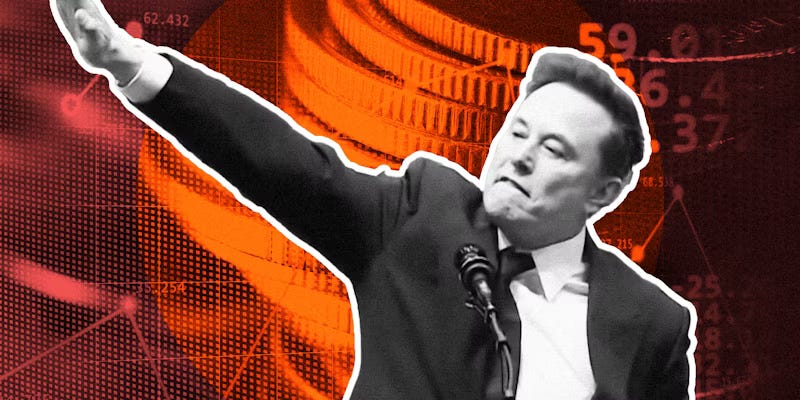
The Ignorance of a Genius
Elon Musk is a brilliant engineer—perhaps even a genius—but even highly intelligent people can be ignorant. You will recall from our earlier discussion that ignorance isn’t just a lack of knowledge. It also includes a fundamental lack of awareness or failure to appreciate some time-honored principles about functioning effectively in the world. Let’s explore a few of them.
Maxim 1. Wisdom believes in truthfulness and transparency; ignorance generally claims to do the same, but is more than willing to be deceptive, duplicitous, and dishonest in order to get what it wants.
In 2018, Musk falsely tweeted that he had secured the funding needed to take Tesla private at $420 per share. When it turned out to be completely false, the Securities and Exchange Commission (SEC) fined him $20 million, forced him to step down as Tesla chairman, and required legal oversight of his future tweets about the car company.
After acquiring the social media platform Twitter (now X), Musk initially tried to back out of the purchase, falsely claiming that Twitter had misrepresented the number of bots on the platform. After he was forced to complete the acquisition, he justified mass layoffs and drastic changes by citing financial instability—despite previous assurances to employees about job security.
Musk has also promoted misinformation on COVID-19, election security, and geopolitical events, often amplifying conspiracy theories to his massive audience. He almost never corrects false statements when confronted with evidence, choosing instead to “double down,” shift blame, or attack critics.
Maxim 2. Wisdom treats opponents as worthy adversaries who should be accorded courtesy and respect. Ignorance, by contrast, views opponents as enemies to be ridiculed, disparaged, humbled, or crushed.
In 2022, after Nancy Pelosi’s husband, Paul Pelosi, was violently attacked in his home, Musk immediately tweeted a link to a baseless conspiracy theory insinuating an inappropriate relationship between Pelosi and his attacker (after being “called out” for his despicable post, Musk later deleted it).
Musk has repeatedly mocked Senator Elizabeth Warren, calling her “Senator Karen” for her position that billionaires should pay higher taxes. And in a recent “X” post, he said “You are a traitor!” to Arizona Senator Mark Kelly, a former U.S. Navy pilot and retired U.S. astronaut, for supporting continued U.S. aid to Ukraine. Musk has repeatedly behaved in a similar fashion with employees and business associates, demonstrating a fundamental lack of understanding about how to treat people who disagree with him.
Maxim 3. Wisdom attempts to make considered, rational, and relevant arguments when advancing a position. Ignorance occasionally does so as well, but frequently hinders its own cause by inserting reckless, wildly inaccurate, and even incendiary statements.
In early February of this year, Musk said, “USAID is a criminal organization. Time for it to die.” And not long after that, he called Social Security “the biggest Ponzi scheme of all time.” While it is clearly legitimate to question a program’s effectiveness—or even the need for its existence—the descent into inflammatory language reflects a fundamental lack of awareness about how to engage in reasoned debate or civilized discourse.
Maxim 4. Wisdom is deeply concerned with understanding the human implications of its actions and policies. Ignorance, by contrast, is preoccupied with the pursuit of its own goals, regardless of the cost to those who might be negatively affected.
Over the years, I’ve learned that people don’t have to have formal training in psychology to accurately assess another person’s level of empathy or compassion, so I’ll leave this one up to you. On a scale from zero to ten, where would you rate Musk on those two attributes?
In a number of press interviews while promoting his 2023 biography of Musk, Walter Isaacson made several references to Musk’s “demon mode,” and, in what strikes me as a massive understatement, said, “I think that he does not have a fingertip feel for, you know, empathy, emotions.”
To expand on that point, let me add one more thing. If your mother fails to get her Social Security check next month, or your disabled uncle doesn’t receive his Medicaid or VA benefits, you can rest assured that Elon Musk will be so busy celebrating his recent accomplishments that he won’t lose a minute’s sleep over these unfortunate developments.
To conclude, everything I’ve written in this week’s post is condensed in this 1819 observation from one of history’s most famous figures:
This week, take a few moments to reflect on how ignorance—your own as well as the ignorance of others—has shown up in your life. And if you happen to be one of those people who voted “R” in the last election, but are now deeply worried about the price of eggs, the future of your Social Security checks, the uncertain status of Medicare, the declining stock market, the additional $10,000 you may be paying for your next car because of what the Wall Street Journal called “dumb” tariff policies, and the current administration’s efforts to shove Project 2025 down your throat whether or not you like it, please don’t beat yourself up for making the wrong decision in the last election. Just make sure you make the right decision in the next one.
As usual, I’ve assembled a number of quotations to assist you in your reflections:
To be ignorant of one’s ignorance is the malady of the ignorant. — A. Bronson Alcott
Ignorance, allied with power, is the most ferocious enemy justice can have. — James Baldwin
A great deal of intelligence can be invested in ignorance when the need for illusion is great. — Saul Bellow
Ignorance is an evil weed, which dictators may cultivate among their dupes, but which no democracy can afford among its citizens. — William Beveridge
The highest form of ignorance is to reject something you know nothing about. — Wayne W. Dyer
Stupidity’s the deliberate cultivation of ignorance. — William Gaddis
Ignorance is not bliss. Ignorance is impotence; it is fear; it is cruelty; it is all the things that make for unhappiness. — Winifred Holtby
Reason obeys itself; and ignorance submits to whatever is dictated to it. — Thomas Paine
Ignorance is not a simple lack of knowledge but an active aversion to knowledge, the refusal to know, issuing from cowardice, pride, or laziness of mind. — Karl Popper
The people who are scariest to me are the people who don’t even know enough to realize how little they know. — Thomas Sowell
For source information on these quotations, and more observations on the theme of IGNORANCE, go here.
Cartoon of the Week:
Answer to This Week’s Puzzler:
Isaac Asimov (1920-92)
Dr. Mardy’s Observation of the Week:
Thanks for joining me this week. See you next Sunday, when the theme will be “Integrity.”
Mardy Grothe
Websites: www.drmardy.com and www.GreatOpeningLines.com
Regarding My Lifelong Love of Quotations: A Personal Note



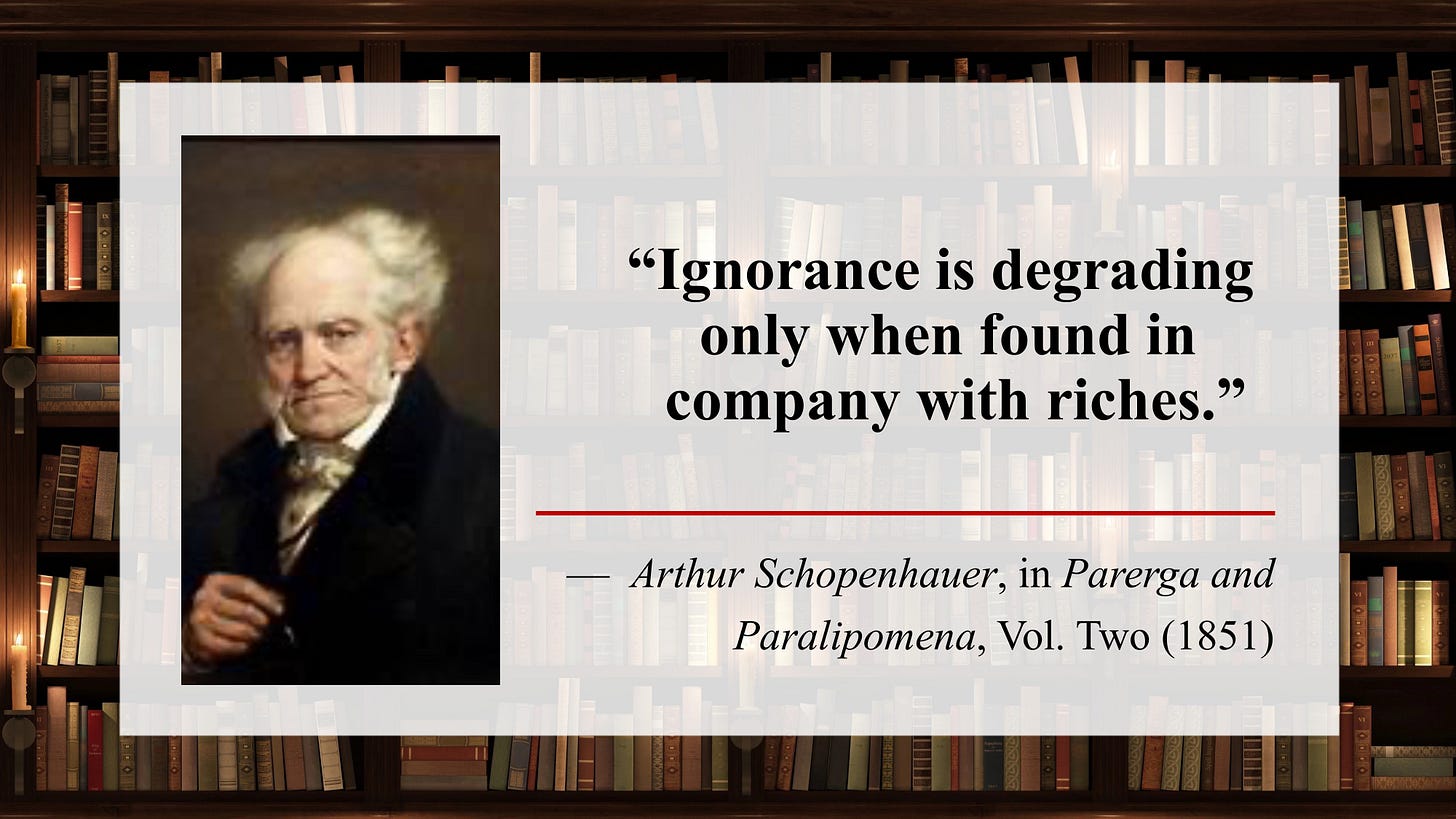

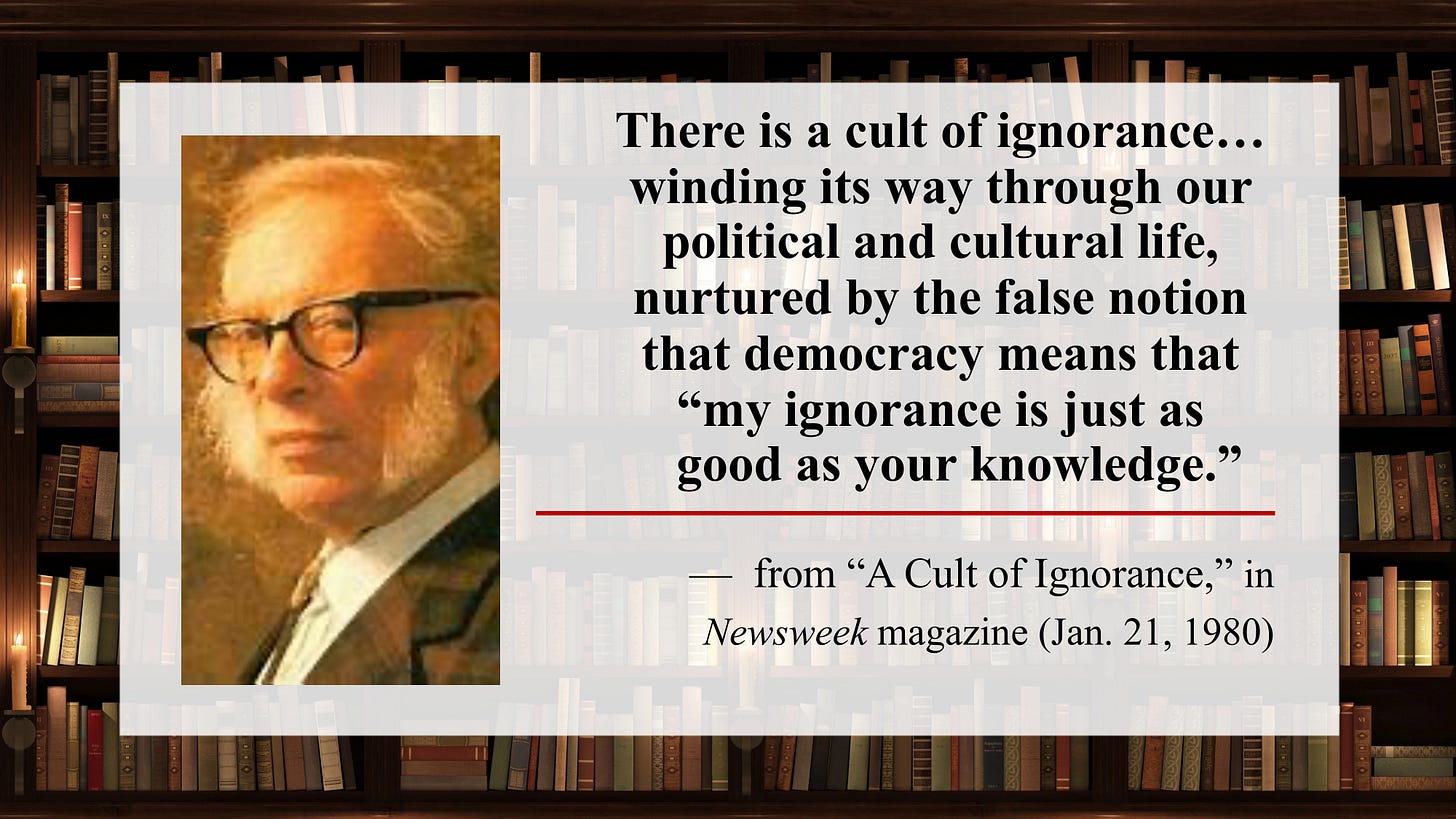


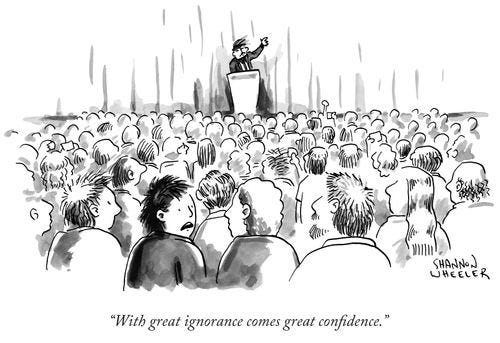
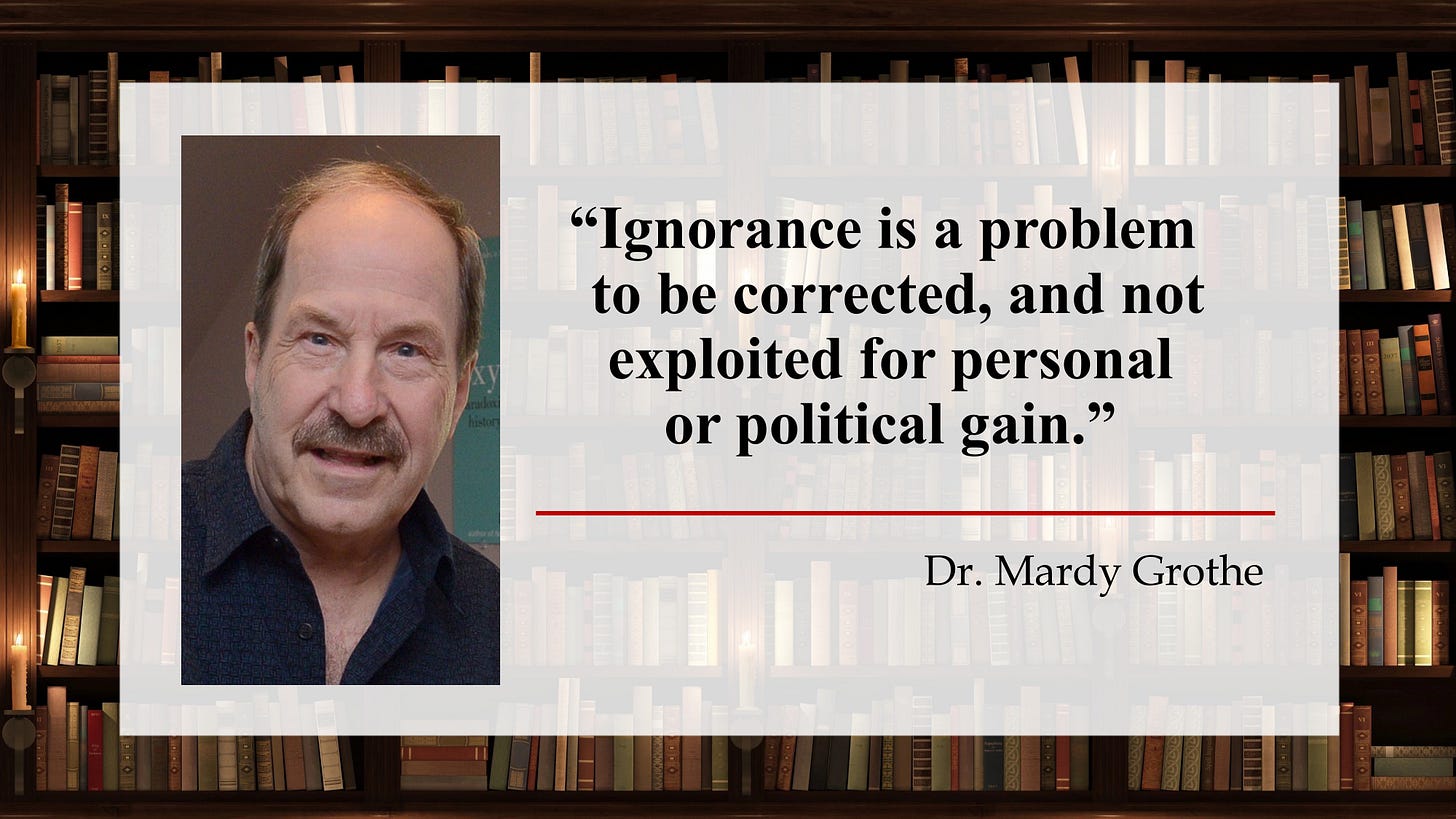
One of my favorite quips: "what's the difference between ignorance and apathy? I don't know and I don't care".
I was shocked and dismayed by this week's writing, Mardy. I have always enjoyed your efforts as appealing to the intellect and staying above the sordid reality of much of today's world. I hope this is the last time that you base your article on your personal politics. You are entitled to them, but not to let them intrude on our weekly enjoyment.
I also would suggest that there's something fundamentally fallacious about your analysis of ignorance. As I was reading, I kept thinking about all the many mistakes I've made in my life due to ignorance. Yet I am well-educated, somewhat knowledgeable on a wide range of subjects, but certainly ignorant on all subjects at various levels of detail.
I would respectively suggest that the issue is not ignorance itself, but how we treat it. Do we humbly accept that our understanding may be wrong or that there are additional truths that, if known, would change our opinion - or do we arrogantly stay firm in our beliefs?
As far as your rant about Elon Musk (it really can be called nothing less), I would classify you as being arrogant. And that is a descriptor that I never would have thought to apply to you. You know the respect I have held you in.
I'm not going to debate your accusations (and many are debatable in my opinion), except where you challenge his emotional intelligence. I've heard many times that Musk is autistic and, if true, would that not explain his lack of empathy - and, with your professional expertise, should you not know that?
I do hope that next week we return to the enjoyable intellectual discussion of past writing.